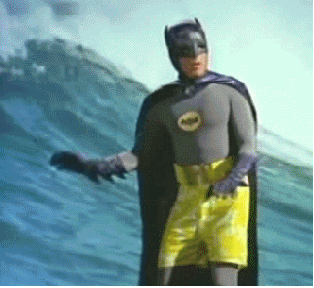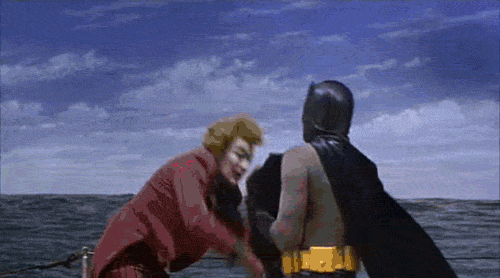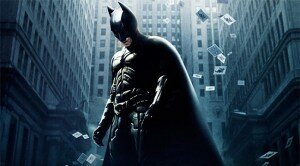Even though Superman may have kick-started comic book super heroism, many fans will tell you that his greatest achievement was paving the way for Batman. The most human superhero, yet somehow the most badass, has captured the hearts and minds of readers across the globe; it’s no surprise that the Batman films have paved the way for comic book adaptations for almost half a century now. From Adam West’s goofy misadventures to Christian Bale’s gritty pack-a-day growl, the cinematic exploits of Bruce Wayne and his shadowy alter eager have served as a litmus test of sorts for the superhero films of any given decade. Let’s take a walk through film history, and see how the Dark Knight has shaped films that have raked in billions of box office dollars.
To be fair, the inception of the Batman media franchise actually began with serials – short films that would release new “episodes” each week. Think of them as the precursor to TV, only you’d need to go to the theater to see each new installment. However, these early adaptations were doomed to critical and commercial mediocrity, due to poor timing (they were released in the WWII era), low production value, and racially charged subject matter. For most cinema fans, the Batman saga began with 1966’s Batman, starring none other than the incomparable Adam West.
The film was a cash-in on the popularity of the Batman TV show, which had run one of two very successful seasons by the release time. As pop culture fans may be well aware, this iteration had no shortage of campiness to it. Whereas modern Batfans are used to savage beatings and moral grey areas, West’s Batman spent a lot of his time surfing:

Dancing:
and fighting with both words and fists:

As you can see, Batman: The Movie ended up being more of a parody than a proper comic book adaptation – West and Robin player Burt Ward consistently broke the fourth wall (i.e. directly addressed the audience), the special effects were of laughably low-quality, and the grim nature of Wayne’s backstory was largely glossed over. It is perhaps owing partly to this tongue-in-cheek goofiness that another Batman film wouldn’t hit theaters for more than twenty years. In fact, superhero films in general fell off the radar until 1978’s Superman brought spandex-clad justice back to the big screen. Still, other than a few notable entries (Superman II), the superpowered genre was largely unsuccessful both critically and commercially. Enter Tim Burton, stage left.
American enthusiasm and hopefulness were at an all-time high in 1989. It was the tail-end of the economic boon brought on by Ronald Reagan’s presidency, and the stage was set for great things to happen in the movies. What ends up being most surprising about this year’s version of Batman is how dark it came out – relatively speaking, of course. Critics ended up slamming Burton for focusing more on Jack Nicholson’s Joker than Michael Keaton’s Batman. Furthermore, Batman’s underlying instability is brought to the forefront, as Burton examines just how disturbed one needs to be to become a masked vigilante. Still, Batman received mostly positive reviews for its unmatched production design and, as Roger Ebert put it, “style over substance,” and even managed to beat out Indiana Jones and the Last Crusade in the domestic box office. This set the stage for a second Burton Batman outing, Batman Returns (1992), which audiences, critics, and even Burton himself enjoyed even more than the first. Among the highlights are a stellar cast (Danny DeVito as the Penguin, Michelle Pfeiffer as Catwoman, and Christopher Walken as Christopher Walken Max Schreck) and set design that even outdid the first installment.
Three years later, Burton handed the directorial reins over to Joel Schumacher for Batman Forever. This film and its sequel, Batman and Robin (1997), took an ill-advised return to the campiness of 1960s Batman. While such family-friendly goofiness may have passed muster thirty years prior, Burton’s work with the Dark Knight’s psychological hang-ups made such antics obsolete. The cast in both films also didn’t do them any favors. Val Kilmer, while not terrible, was a forgettable Batman at best; successor George Clooney, however, would go down in history as the worst Batman of all time. To be fair, his co-stars didn’t deserve any Oscars, either. Arnold Schwarzenegger’s Mr. Freeze threw around enough bad puns to make Steven Wright groan, and Alicia Silverstone received a Razzie award for Worst Supporting Actress. Indeed, Batman and Robin was bad enough to kill the movie franchise until Christopher Nolan rebooted it in the 2000s. However, while Schumacher was dropping the ball in a big pile of camp stew, other films like The Crow (1994) were pioneering the on-screen violence and gritty grimness that made the Dark Knight trilogy possible.
That brings us to the Bale years, and beyond. Say what you will about Inception and Nolan’s other efforts, but he completely reinvented the genre from Batman Begins (2005) to The Dark Knight Rises (2012). Never before had a superhero gone through such on-screen torment, only to still be vilified by his public at the end. We all have accepted Heath Ledger’s Joker as one of the best villains of all time, and… well, aside from a few reasonable gripes with the conclusion, there’s not much to whine about. The dark tone was so successful, Nolan inspired other, more light-hearted supers to take a turn down Grimdark Boulevard. Man of Steel (2013) was the darkest superman flick by far, and the Spiderman movies have made many a small child reel in surprise at the reality of Peter Parker’s situation – no more funny cartoon misadventures, here.
Simply put, Batman has always been the precursor to major trends in both comics and action movies. His films has garnered the most critical and commercial success of any superhero, and, come Halloween, you’ll find the most kids dressing up as him over a goody two-shoes Kryptonian or sociopathic robot-building alcoholic. The very existence of The Avengers and all of Marvel’s comic book films is owed to the World’s Greatest Detective. Even if he’s going to be Ben Affleck in his next incarnation, he’ll still be the paragon of spandex movies.




























